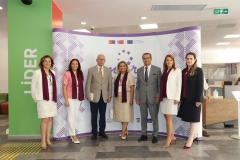
FACULTY OF COMMUNICATION
Department of Public Relations and Advertising
GENS 203 | Course Introduction and Application Information
| Course Name |
Health and Life
|
|
Code
|
Semester
|
Theory
(hour/week) |
Application/Lab
(hour/week) |
Local Credits
|
ECTS
|
|
GENS 203
|
Fall/Spring
|
3
|
0
|
3
|
6
|
| Prerequisites |
None
|
|||||
| Course Language |
English
|
|||||
| Course Type |
Service Course
|
|||||
| Course Level |
-
|
|||||
| Mode of Delivery | - | |||||
| Teaching Methods and Techniques of the Course | - | |||||
| Course Coordinator | ||||||
| Course Lecturer(s) | ||||||
| Assistant(s) | - | |||||
| Course Objectives | 1- to define and list the physical, environmental, social and psychologic health problems of those concerning global health, 2- to inform students about how to provide and sustain a healthy lifespan of their own and the public. |
| Learning Outcomes |
The students who succeeded in this course;
|
| Course Description | 1-Under the topics of physical, social, environmental and mental health, major health problems concerning most of the world's population with their acute and/or chronic effects are evaluated throughout this course. 2-The course content is designed to give students a theoretical background about leading a healthy life. |
|
|
Core Courses | |
| Major Area Courses | ||
| Supportive Courses | ||
| Media and Management Skills Courses | ||
| Transferable Skill Courses |
WEEKLY SUBJECTS AND RELATED PREPARATION STUDIES
| Week | Subjects | Related Preparation |
| 1 | Introduction to the course Harms of tobacco use and tobacco addiction treatment options | 1. Lam TH, Ho SY. Tobacco. In: Detels R, Gulliford M, Karim QA, Tan CC (eds). Oxford Textbook of Global Public Health. 6th ed., Oxford: Oxford University Press; 2015. p.1217-1233. 2. Donatelle, Rebecca, Health: The Basics (10th edition). San Francisco, CA Pearson Ed. Inc.. 2013. p.246-266. |
| 2 | Abuse of alcohol and other substances | 1. Room R. Alcohol. In: Detels R, Gulliford M, Karim QA, Tan CC (eds). Oxford Textbook of Global Public Health. 6th ed., Oxford: Oxford University Press; 2015. p.1249-1262 2. Donatelle, Rebecca, Health: The Basics (10th edition). San Francisco, CA Pearson Ed. Inc.. 2013. p.231-246. |
| 3 | Healthy sex life- Discussion | 1. Donatelle, Rebecca, Health: The Basics (10th edition). San Francisco, CA Pearson Ed. Inc.. 2013. p.135-201. |
| 4 | Sexually transmitted infections / HIV-acquired immunodeficiency syndrome (AIDS) / 1st Assignment | 1. Kamb ML, Garcia PJ. Sexually transmitted infections. In: Detels R, Gulliford M, Karim QA, Tan CC (eds). Oxford Textbook of Global Public Health. 6th ed., Oxford: Oxford University Press; 2015. p.1104-1122. 2. Vermund SH, Solomon S.HIV-acquired immunodeficiency syndrome In: Detels R, Gulliford M, Karim QA, Tan CC ed., Oxford: Oxford University Press; 2015. p.1122-1144. |
| 5 | Mental Health and problems Stress and ways to cope with stress Quiz | 1. Donatelle, Rebecca, Health: The Basics (10th edition). San Francisco, CA Pearson Ed. Inc.. 2013. p.66-96 |
| 6 | Lifestyle Medicine and Preventing Diseases a.Diabetes mellitus b.Obesity c.Importance of physical activity | 1. James M. Rippe, Lifestyle Medicine (Second Edition), CRC Press, 2013. p.421-455. p.515-583. p.209-223. |
| 7 | Lifestyle Medicine and Preventing Diseases -Cardiovascular diseases -Cancers | 1. Reddy KS. Prevention and control of non-communicable diseases. In: Detels R, Gulliford M, Karim QA, Tan CC (eds). Oxford Textbook of Global Public Health. 6th ed., Oxford: Oxford University Press; 2015. p.1476-1484. 2. Wong ND. Epidemiology and prevention in cardiovascular disease. In: Detels R, Gulliford M, Karim QA, Tan CC (eds). Oxford Textbook of Global Public Health. 6th ed., Oxford: Oxford University Press; 2015. p.909-923. |
| 8 | Occupational Diseases Midterm Exam | 1. Koh D, Aw T-C. Occupational health. In: Detels R, Gulliford M, Karim QA, Tan CC (eds). Oxford Textbook of Global Public Health. 6th ed., Oxford: Oxford University Press; 2015. p.868-900. |
| 9 | Nutrition Ergonomics | 1. Rakel RE, Rakel D: Textbook of family medicine, 8th ed. edn: Elsevier Health Sciences; 2011. 2. Willems, S., De Maesschalck, S., Deveugele, M., Derese, A., & De Maeseneer, J. (2005). Socio-economic status of the patient and doctor–patient communication: does it make a difference?. Patient education and counseling, 56(2), 139-146. 3. Shetty PS. Food and nutrition. In: Detels R, Gulliford M, Karim QA, Tan CC (eds). Oxford Textbook of Global Public Health. 6th ed., Oxford: Oxford University Press; 2015. p.180-201. 4. Barrero LH, Caban-Martinez AJ. Musculoskeletal disorders. In: Detels R, Gulliford M, Karim QA, Tan CC (eds). Oxford Textbook of Global Public Health. 6th ed., Oxford: Oxford University Press;2015. p.1046-1060. |
| 10 | Exercise | 1. Laura Larsen, Health Reference Series, Fitness and Exercise Sourcebook (4th edition), Omnigraphics Inc. 2010. p.275-383. |
| 11 | Sleep 2nd Assignment | 1. Donatelle, Rebecca, Health: The Basics (10th edition). San Francisco, CA Pearson Ed. Inc.. 2013. p.96-109. |
| 12 | Water and hygiene Effects of radiation on human health | 1. Kheifets L, Green A, Wakeford R.Radiation and public health.. In: Detels R, Gulliford M, Karim Oxford Textbook of Global Public Health. 6th ed., Oxford: Oxford University Press; 2015. p.840-857. |
| 13 | Indoor and outdoor air pollution Biological and chemical factors affecting individual and public health | 1. Gulliver J, de Hoogh K. Environmental exposure assessment:modelling air pollution concentrations. In: Detels R, Gulliford M, Karim QA, Tan CC (eds). Oxford Textbook of Global Public Health. 6th ed., Oxford: Oxford University Press; 2015. p.857-868. 2. Kelley NS, Osterholm MT. Bioterrorism. In: Detels R, Gulliford M, Karim QA, Tan CC (eds). Oxford Textbook of Global Public Health. 6th ed., Oxford: Oxford University Press; 2015. p.1206-1217 |
| 14 | Planetary Health and Politics Environmental Health Problems | 1. Chen C-J. Environmental health issues in public health. In: Detels R, Gulliford M, Karim QA, Tan CC (eds). Oxford Textbook of Global Public Health. 6th ed., Oxford: Oxford University Press;2015. p.823-840. 2. https://www.planetaryhealthalliance.org/planetary-health |
| 15 | Discussion and general review of the course | |
| 16 | Final Examination |
| Course Notes/Textbooks |
|
| Suggested Readings/Materials |
EVALUATION SYSTEM
| Semester Activities | Number | Weigthing |
| Participation |
15
|
5
|
| Laboratory / Application | ||
| Field Work | ||
| Quizzes / Studio Critiques |
2
|
20
|
| Portfolio | ||
| Homework / Assignments |
1
|
20
|
| Presentation / Jury | ||
| Project | ||
| Seminar / Workshop | ||
| Oral Exams | ||
| Midterm |
1
|
20
|
| Final Exam |
1
|
35
|
| Total |
| Weighting of Semester Activities on the Final Grade |
19
|
65
|
| Weighting of End-of-Semester Activities on the Final Grade |
1
|
35
|
| Total |
ECTS / WORKLOAD TABLE
| Semester Activities | Number | Duration (Hours) | Workload |
|---|---|---|---|
| Theoretical Course Hours (Including exam week: 16 x total hours) |
16
|
3
|
48
|
| Laboratory / Application Hours (Including exam week: '.16.' x total hours) |
16
|
0
|
|
| Study Hours Out of Class |
15
|
2
|
30
|
| Field Work |
0
|
||
| Quizzes / Studio Critiques |
2
|
14
|
28
|
| Portfolio |
0
|
||
| Homework / Assignments |
2
|
20
|
40
|
| Presentation / Jury |
0
|
||
| Project |
0
|
||
| Seminar / Workshop |
0
|
||
| Oral Exam |
0
|
||
| Midterms |
1
|
18
|
18
|
| Final Exam |
1
|
30
|
30
|
| Total |
194
|
COURSE LEARNING OUTCOMES AND PROGRAM QUALIFICATIONS RELATIONSHIP
|
#
|
Program Competencies/Outcomes |
* Contribution Level
|
||||
|
1
|
2
|
3
|
4
|
5
|
||
| 1 | To be able to critically interpret theories, concepts, methods, instruments and ideas that form the basis of Public Relations and Advertising field. |
|||||
| 2 | To be able to collect and use necessary data to produce content in the field of Public Relations and Advertising with scientific methods. |
|||||
| 3 | To be able to use theoretical knowledge gained in the field of Public Relations and Advertising in practice. |
|||||
| 4 | To be able to use analytical thinking skills in the field of Public Relations and Advertising. |
|||||
| 5 | To be able to convey creative ideas and solution suggestions supported by scientific data in written and oral form to stakeholders. |
|||||
| 6 | To be able to take responsibility as individual and group members to solve problems encountered in the practice of Public Relations and Advertising field. |
|||||
| 7 | To be able to develop solutions that favor public good and raise awareness by having knowledge about regional, national and global issues and problems. |
|||||
| 8 | To be able to relate the basic knowledge of other disciplines supporting the field of Public Relations and Advertising with his/her own field of expertise. |
|||||
| 9 | To be able to use the knowledge, skills and competencies acquired by following regulations, innovations, changes, current developments, and occupational health and safety practices closely in the field of Public Relations and Advertising; in a lifelong manner and for individual and social purposes. |
|||||
| 10 | To be able to collect, interpret and share data by considering social, scientific and professional ethical values in the field of Public Relations and Advertising. |
|||||
| 11 | To be able to collect data in the areas of Public Relations and Advertising and communicate with colleagues in a foreign language ("European Language Portfolio Global Scale", Level B1) |
|||||
| 12 | To be able to speak a second foreign at a medium level of fluency efficiently. |
|||||
| 13 | To be able to relate the knowledge accumulated throughout the human history to their field of expertise. |
|||||
*1 Lowest, 2 Low, 3 Average, 4 High, 5 Highest
NEWS |ALL NEWS
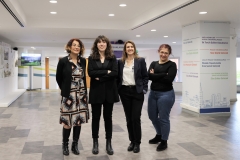
1.3 million support from TUBITAK for the exemplary project
4 academics from Izmir University of Economics (IUE) took action on the increase in natural disasters such as floods, fires, tornadoes and
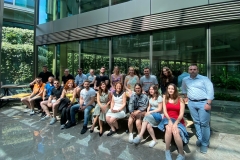
7 industrial visits in 3 days
Izmir University of Economics (IUE) Department of Public Relations and Advertising organized an industrial visit to Istanbul for its students to offer
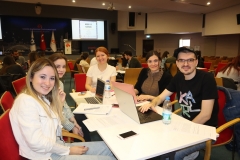
‘Kindness in Communication’ ideas by IUE students
Students of Department of Public Relations and Advertising, Izmir University of Economics (IUE) developed creative ideas for a world-famous tire brand (Continental)
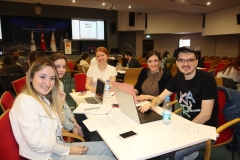
‘Kindness in Communication’ ideas by IUE students
Students of Department of Public Relations and Advertising, Izmir University of Economics (IUE) developed creative ideas for a world-famous tire brand (Continental)
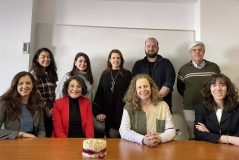
Our department, which was accredited by the Communication Research Association (ILAD) in 2020, successfully completed the interim evaluation process and was entitled to a total of five years of accreditation.
ILAD, the national quality assurance institution authorized by the Higher Education Quality Board (YÖKAK) for communication education, accredited our Public Relations and
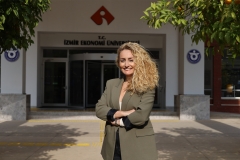
IUE graduate academic at a world-renowned university
Lena Çavuşoğlu, a graduate of Izmir University of Economics (IUE), pursued her dreams about having an academic career abroad instead of working

'International' cooperation of Izmir University of Economics
Izmir University of Economics (IUE) Department of Public Relations and Advertising took another important step towards internationalization and collaborated with the famous

